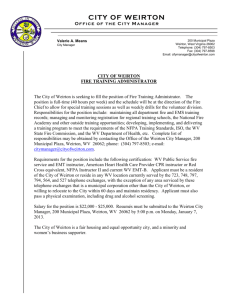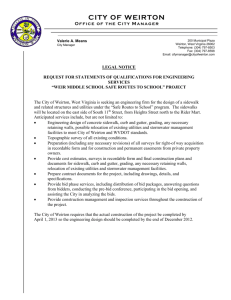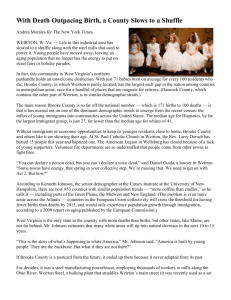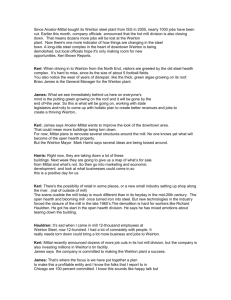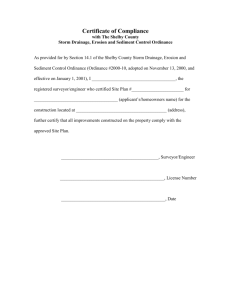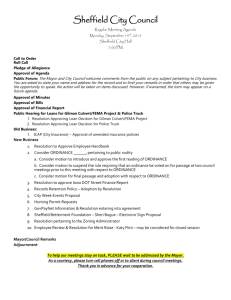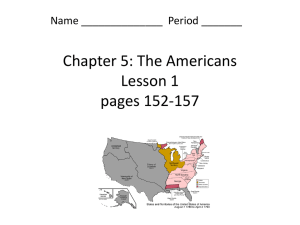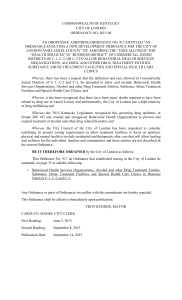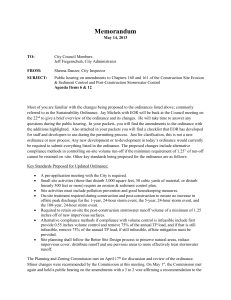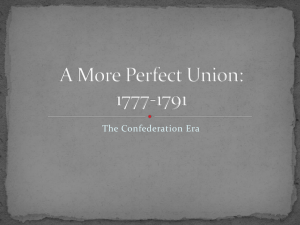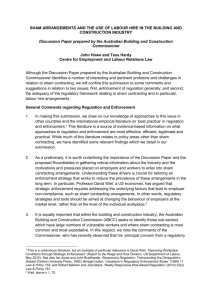City of Weirton 2014 Municipal Home Rule Plan
advertisement
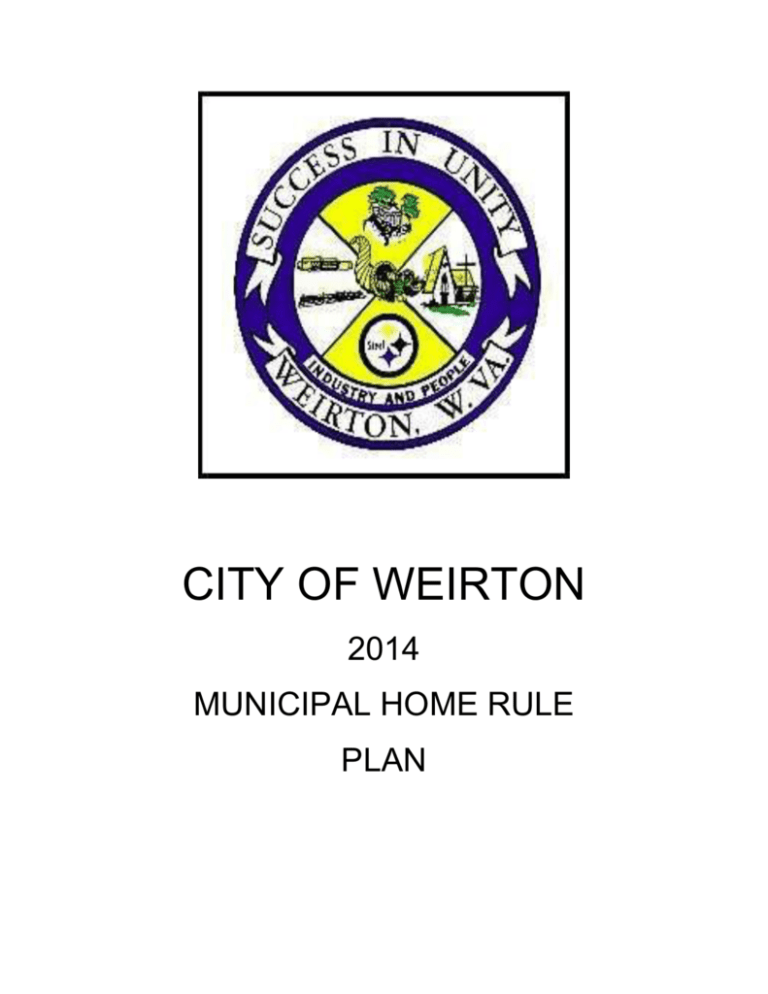
CITY OF WEIRTON 2014 MUNICIPAL HOME RULE PLAN SECTION II NARRATIVE CITY OF WEIRTON HOME RULE PLAN DETAILS CITY OF WEIRTON MUNICIPAL HOME RULE PLAN THE PLAN- Pursuant to WV State Code § 8-1-5a, the City of Weirton proposes the following Municipal Home Rule plan: Issue 1- Probationary Employment of Uncertified Building/Zoning Code Officials(Administrative Category) Problematic State Regulation- Title 87 Legislative Rules of the State Fire Commission, Series 7-Standards for the certification and continuing education of Municipal County, and other Public Sector Building Code Officials, Building Code Inspectors and Plans Examiners. Problem- The City of Weirton employs a multi-person building and zoning code department and is considered a “Multi-person Jurisdiction” under the above mentioned State regulation definition §87-7-2.1.1. The City of Weirton has several Certified Code Officials and due to the further language found in §87-7-6.1- Alternative for probationary Employment of Uncertified Officials, the City is in jeopardy and hardship when the situation arises where we lose personnel. Because we cannot show that “there is a lack of certified persons available to serve” in this job function under City employ, we are denied provisional status of a new hire because the State Fire Marshal regulation does not consider this a hardship. This provisional status is desperately needed in order to efficiently continue operations of the department. With the required testing schedule, it can take 18 to 24 months for an official to obtain all the required certifications for the work the City of Weirton’s inspection department performs. To obtain minimum certification for property maintenance and single family inspections alone the time frame is 12 months; therefore, without the provisional status, the City does not have the necessary manpower to effectively operate. We are currently experiencing this hardship, as we lost an employee recently. We have replaced the individual, but due to the current regulation, we can only use this new employee in a very limited fashion. This equates to spending 14 weeks on salary and benefits for this individual without utilizing them for the job for which they were hired. (14 weeks is a best case scenario for property maintenance licensure only) We then must also incur overtime for our current certified officials who quickly become overburdened, and are likely to seek employment elsewhere; therefore, setting the cycle over. Solution- The City proposes to establish through an ordinance a two-year provisional status for a new hire Code Official. The City does not intend on changing the actual requirements and certifications needed; we will continue to follow the rules and regulations as promulgated by the State Fire Commission and obtain a State license. But the provisional status will allow the City to hire and get the employee in the field being productive as they are obtaining their certifications. The City will establish in the ordinance all the details under which the provisional employee will work and establish a robust over site program. The City believes that this combined training program of provisional status field work and simultaneous study preparation for certifications gives the most productive and cost effective scenario for this position. Issue 2-Building/Zoning Code Officials Enforcement Provisions(Administrative Category) Problematic State Code- WV State Code § 8-12-16- Ordinances regulating the repair, closing, demolition, etc., of dwellings or buildings unfit for human habitation; procedures. Problem- Although the above WV code section offers much assistance to the City building enforcement by the City’s Inspection Department, it does not provide clear authority for the City’s Building and Zoning Code Officials to issue “on site” citations for external property maintenance, building structure and zoning violations. The City has been faced with challenge when attempting to pursue this type of enforcement. Sections of WV Code § 8-12-16, for example, state “all orders issued by the enforcement agency shall be served in accordance with the law of this state concerning the service of process in civil actions, and, be posted in a conspicuous place on the premises affected by the complaint or order”, as well as “no ordinance may be adopted without providing for the right to apply to the circuit court for a temporary injunction restraining the enforcement agency pending final disposition of the cause”, and lend credence to those who would believe that the City would have wrongfully attempted enforcement. These code sections create a stagnate and long-term process for the City, in most cases months, for successful prosecution and correction of the issues. Also, it requires Police personnel to issue the warrants, as well as Municipal Court time. It also fosters, most especially to the repeat offenders, an environment where they can successfully manipulate enforcement of their violations by partial improvements or promises to get their case dismissed or assessed a minor fine. They then repeat the violation or commit new ones only to know the clock starts over affording them additional time. The City ends up with streets and sometimes entire neighborhoods detracted and citizens in an uproar, believing the City has done nothing to enforce corrections to the violation. While the City does expend additional manpower in the current repetitive process, and this is certainly important, it is more about the public safety and beatification concerns that make this issue one of our top priorities. It is extremely difficult to attract new businesses and residents when a city lacks curb appeal and the Citizens and business owners believe these are not a high priority for the City. Solution- The City proposes to establish authority by ordinance granting the City’s Building and Zoning Code officials the power to issue City-wide citations for exterior sanitation and common nuisance eyesore violations, including such violations as trash, high grass, weeds, unlawfully situated motor vehicles, dilapidated buildings, broken windows and other structure violations, sidewalk and driveway maintenance issues, etc. pertaining to occupied as well as vacant properties. This will allow for expedited service and court processing of the violations, reduced manpower and an increased positive public perception that the City administration does consider this a major issue and does take the necessary steps to resolve the matters as quickly as possible. Issue 3-Police Officers Enforcement Provisions in Alcohol Beverage Control Commission (ABCC) Establishments(Administrative Category) Problematic State Code- WV State Code § 11-16-4- Responsibility of alcohol beverage control commissioner; administrators, employees and agents; administration and enforcement expenses Problem- The above WV code section does not provide clear authority for the City’s Police Officers to enter a ABCC regulated establishment for investigation or the prevention of crime without the presence of one of the limited number of ABCC special investigators. The code § 11-16-4 (b) states specifically “The commissioner shall appoint an adequate number of competent persons to serve as administrators, employees and agents of the commissioner” and goes on to state “such administrators, employees and agents shall have the right to enter any licensed premises in the state in the performance of their duties at any hour of the day or night when beer is being sold or consumed on such licensed premises”. The number of these ABCC investigators is also limited by further language in the same code section that states “That the commissioner may employ up to eleven special investigators”. Because of the City of Weirton’s location bordering the State of Ohio and the Commonwealth of Pennsylvania, we encounter situations that are a direct reflection of our location. One such situation is the increase in criminal activity the City sees between the hours of 2AM (the time bars and nightclubs close in bordering states) and 4AM ( closing time in WV). The City’s Police department is hindered in its ability to investigate criminal activity and leads by not having the legal means to enter these establishments without ABCC personnel. Timing is critical to successful apprehension of individuals suspected of criminal activity; it is not in the best interest of public safety to wait. Solution- The City proposes to establish authority by ordinance granting the City’s Police officers the ability to enter an ABCC regulated establishment for investigation or the prevention of crime without the presence of one of the limited number of ABCC special investigators. Direct access to these establishments will greatly improve the City Police department’s law enforcement of suspected criminal activity such as narcotics distribution and use. Also, the City believes a Police presence would cut down on violent crimes involving suspected gang members and firearms. Direct access would give the Weirton Police Department another public safety tool to use especially in these early morning hours. The City respects the work of the ABCC special investigators and fully intends on continuing to work in conjunction with their efforts as well. Issue 4-Municipal Authority to place restrictions on streets and highways within City limits(Administrative Category) Problematic State Code- WV State Code §17C-17-12. when state road commission or local authorities may restrict right to use highways. Problem- The above WV code section does not provide clear authority for the City Council to regulate by ordinance or resolution all streets and highways within the City limits. §17C-17-12 (a) states “local authorities with respect to highways under their jurisdiction may by ordinance or resolution” place certain restrictions, but for those that are under the City’s jurisdiction only, thereby excluding State jurisdiction roads and highways. This causes problems and delays for the City when attempting to address issues it deems to be of public safety and welfare in regard to streets and highways within City limits. The City has responsibility to meet the needs of its citizens and business owners and to ensure that road and highway concerns such as traffic flow, stop and other road signs, traffic lights, speed limits, weight restrictions, closings, etc. within its limits are assessed and taken care of quickly and by local decision. The City recognizes that any requests made to the State for consideration of such items must meet certain State standards for approval. While the City respects that general standards must be applied State wide and as equitable as possible, sometimes an issue is more pressing or concerning to a localized area within the City. The City believes that in such cases, it should be the City Council that determines the best course of action, even if by the State’s standards it would be denied. Solution- The City proposes to establish authority by ordinance granting the City Council the right to change, modify and or impose certain restrictions such as; but not limited to, traffic flow, stop and other road signs, traffic lights, speed limits, weight restrictions, closures, etc. that it deems necessary to certain streets and highways under the State’s jurisdiction but within the City limits. This authority will enable City Council to quickly address issues and concerns that are a high priority to its citizens and business owners and which they believe is in the best interest of public safety and welfare. The ordinance will specify in detail what changes are allowed as well as which State jurisdiction streets or highways are to be considered covered by the Ordinance. It will also make clear that the costs and maintenance of any such changes will be the responsibility of the City of Weirton. Issue 4 concludes the City of Weirton’s plan for the 2014 Municipal Home Rule Application.
